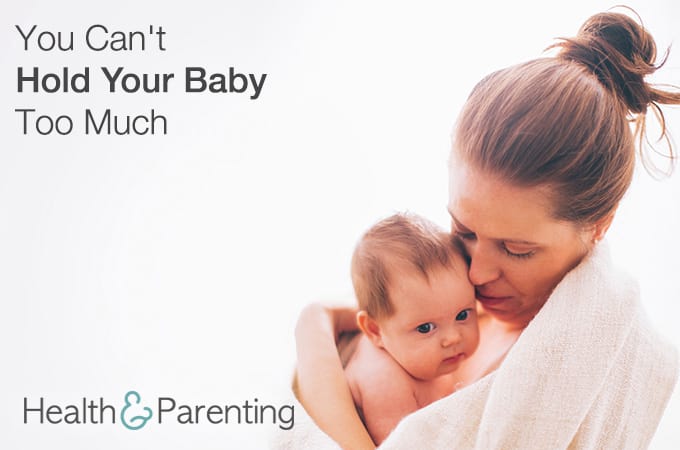“If you pick your baby up every time he cries, you’re going to spoil him!”
“He’s just trying to manipulate you!”
“I see he’s already got you trained!”
How many of these have you heard? But science is on your side – you can’t hold your baby too much, and you’re not creating a whiny brat by picking him up. Instead, responsive parenting teaches your baby about trust and compassion.
Research shows that infant crying usually peaks around six weeks of age, and then decreases by half by 12 weeks of age. Did you know that if mom responds within 90 seconds of baby starting to cry, baby calms quickly? If she waits longer to respond, however, prolonged calming is needed. Who doesn’t want less crying? A quick response to a fussy baby makes a happier, less stressful environment for everyone.
Babies cry for all sorts of reasons, and you’ll be amazed by how quickly you learn to tell the ‘I’m hungry’ cry apart from the ‘I’m tired’ one. As your baby grows, you’ll learn all the other cues he uses to communicate with you. When you respond to those attempts at communication, your baby learns to trust you. You’re teaching your baby how to develop a secure attachment to you, the caregiver.
Studies from the 1950s to present day show that babies who are not responded to tend to grow up insecure, unsure, and more fearful. Babies who are responded to consistently and positively grow to be independent children and adults. In fact, as these babies grow, they …
• Have higher self-esteem
• Have improved focus, and fewer behavior problems
• Are better able to regulate their emotions
• Experience less fear and anxiety
• Are more likely show altruistic behaviors, such as, gratitude, appreciation, and caring
One of the most amazing benefits of responsive parenting and secure attachment is to baby’s brain. Babies experience incredible brain growth during the first two years of life when millions of connections are made between neurons. And the more connections, the better the brain functions. Studies show that parents can influence this growth by their interactions with baby. Being sensitive to baby’s cues, responding consistently, and interacting with baby will all add to baby’s intellectual development.
Holding, cuddling, touching and interacting all boost your baby’s nervous system development without being stressful. Oxytocin, the feel-good hormone of love, is released for both baby and caregiver during these interactions. A win-win for both parties!
So you won’t spoil your baby by picking him up all the time, especially in these first few months – in fact, you’ll do just the opposite.
Written by Michelle, childbirth educator, lactation consultant, and mother to 4 busy kids
This information is not intended to replace the advice of a trained medical doctor. Health & Parenting Ltd disclaims any liability for the decisions you make based on this information, which is provided to you on a general information basis only and not as a substitute for personalized medical advice. All contents copyright © Health & Parenting Ltd 2016. All rights reserved.










